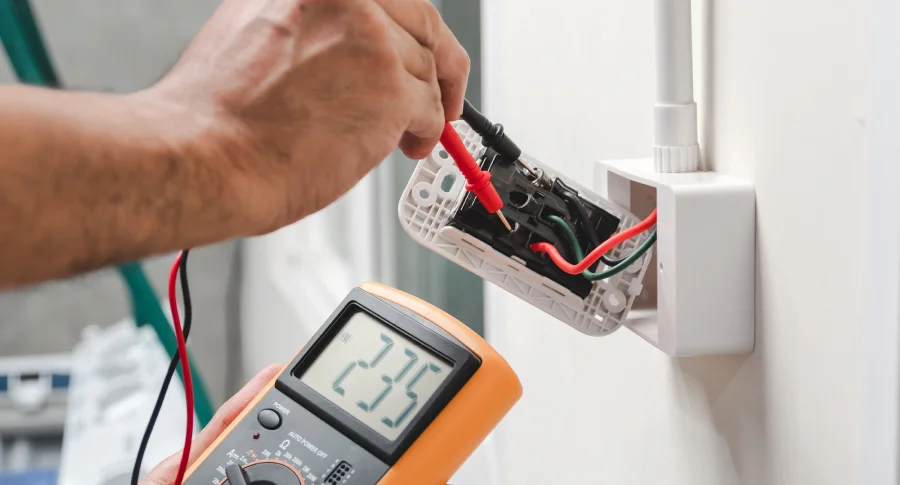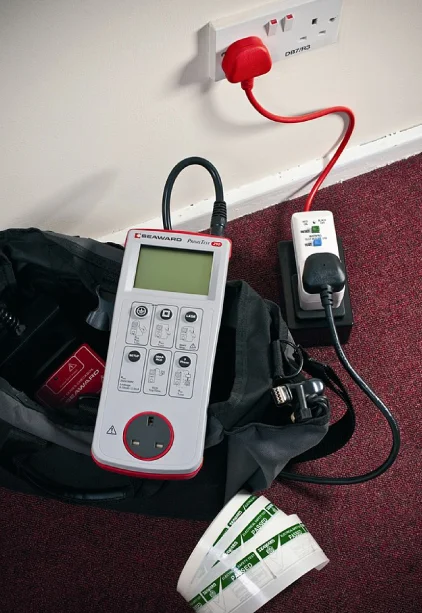
Portable Appliance Testing or PAT being a shortened abbreviation. What is it and what does it cover? Well, it’s a periodic test to ensure all electrical appliances are safe to use. If you are in a rented property and the electrical appliances are supplied by the Landlord as part of the tenancy its mandatory for the appliances to be tested. Any appliance that is not part of a ‘fixed’ installation but needs to be connected to a ‘fixed’ installation is deemed portable. In other words, anything that needs a plug, cable, and socket to operate. What falls into the plug/cable/socket category?
Here is a guide: – a TV, refrigerator (all white goods), PC, kettle, microwave, toasters, electrical tools, stereo equipment, radios, Laptops, electric fans, portable AC units through to portable garden equipment, the list is quite comprehensive and not restricted to the list above. A property or business insurance claim could be invalidated without a valid PAT test. With whom does the responsibility rest? Well, with YOU, if you are an employer, self-employed, or a Landlord
We recommend Landlords arrange for a PAT test before the start of a new tenancy. An appliance that has been tested will have a green label with the date of the test attached (usually) to the cable. PAT testing is an important part of Health & Safety and shouldn’t be ignored.
Portable Appliance Test – More information
The PAT is a process that covers the safety checks of portable electrical equipment in a residential ‘let’ property or business premises to ensure the user’s safety.
While a large area of the test includes visual testing for defects, there are also additional tests for identifying defects. Some of the tests are carried out are relatively simple; others are conducted with professional electrical PAT testing equipment to measure insulation resistance and earth continuity. The time needed depends on the number of appliances and accessibility.
Short answer, is YES. Legally every employer must ensure all electrical appliances/equipment is maintained on a regular bases to prevent any accidents. The ‘Health and Safety at Work act 1974’ is a piece of legislation that pretty much covers occupational Health & Safety in the UK. The frequency of testing mainly depends on usage, quality, and nature of your electrical appliances. For example, portable electrical power tools on construction sites require more frequent inspection and or testing due to them moving regularly around site, compared to an office-based PC.
Although it’s declared necessary to carry out PAT testing on regular bases, the frequency still isn’t clear. The best guidance is given by the HSE. If unsure, please contact them.
Engaging a trade professional to complete your test is always the best advice. Non-qualified or competent persons to undertake the work puts you and others at risk.
You can rely on Greenserve for all your electrical work however large or small your project may be. Our experienced electrical team have years of experience, including appliances. We are here to help. Our services cover all of Greater London and surrounding areas 24/7. If you need professional electrical help, please call.
Although there is no legal requirement to keep any test records, it’s always advisable to keep some sort of record. A label (usually green) should be dated and attached to a tested appliance, which is a form of record-keeping but will but won’t last forever especially if the appliance is being used on site. Common record documentation must include:
- Name/Model of a piece of equipment.
- Equipment serial number.
- The date it was commissioned/purchase date.
- Location of the appliance.
- Class of equipment.
- Previous PAT test date.
- Next PAT test date.
This record is basically intended to identify test frequency and the location of the appliances. Other documentation needs to include the following: -
- Date of inspection.
- Is the tool within its limits, being used in the appropriate environment and the application relevant to the appliance rating?
- Condition of the plug, flexible cable, body of the equipment.
- Test results.
- Is the appliance safe to use?
- The professional testers signature.
Finally, information to include faulty equipment and repair information: -
- The date at which the equipment was taken out of service.
- Description of the respective appliance/equipment.
- Appliance serial number.
- Location.
- The reason why it has been removed from service.
- Will it be safe to use after repair?
New equipment should be supplied in a safe condition fully tested and approved by the manufacturers, so there shouldn’t be any need for any portable appliance testing. However, do bear in mind the conditions under which the appliance is used i.e., if moved around site continuously it’s good practise to visually check it periodically to ensure the appliance is in a safe working condition.
As previously stated, it not a legal requirement but advisory. Every employer or employee has the responsibility to ensure ‘everyone’s’ safety, whether in the office, on-site or elsewhere.
For maximum productivity, people need to know they are working with safe, professionally tested appliances. A visual check will often indicate the condition of an appliance/power tool if at a glance, it looks the worse for wear and ‘risky’, get it professionally checked.
The PAT is a process that covers the safety checks of portable electrical equipment in a residential ‘let’ property or business premises to ensure the user’s safety.
While a large area of the test includes visual testing for defects, there are also additional tests for identifying defects. Some of the tests are carried out are relatively simple; others are conducted with professional electrical PAT testing equipment to measure insulation resistance and earth continuity. The time needed depends on the number of appliances and accessibility.
Short answer, is YES. Legally every employer must ensure all electrical appliances/equipment is maintained on a regular bases to prevent any accidents. The ‘Health and Safety at Work act 1974’ is a piece of legislation that pretty much covers occupational Health & Safety in the UK. The frequency of testing mainly depends on usage, quality, and nature of your electrical appliances. For example, portable electrical power tools on construction sites require more frequent inspection and or testing due to them moving regularly around site, compared to an office-based PC.
Although it’s declared necessary to carry out PAT testing on regular bases, the frequency still isn’t clear. The best guidance is given by the HSE. If unsure, please contact them.
Engaging a trade professional to complete your test is always the best advice. Non-qualified or competent persons to undertake the work puts you and others at risk.
You can rely on Greenserve for all your electrical work however large or small your project may be. Our experienced electrical team have years of experience, including appliances. We are here to help. Our services cover all of Greater London and surrounding areas 24/7. If you need professional electrical help, please call.
Although there is no legal requirement to keep any test records, it’s always advisable to keep some sort of record. A label (usually green) should be dated and attached to a tested appliance, which is a form of record-keeping but will but won’t last forever especially if the appliance is being used on site. Common record documentation must include:
- Name/Model of a piece of equipment.
- Equipment serial number.
- The date it was commissioned/purchase date.
- Location of the appliance.
- Class of equipment.
- Previous PAT test date.
- Next PAT test date.
- Date of inspection.
- Is the tool within its limits, being used in the appropriate environment and the application relevant to the appliance rating?
- Condition of the plug, flexible cable, body of the equipment.
- Test results.
- Is the appliance safe to use?
- The professional testers signature.
- The date at which the equipment was taken out of service.
- Description of the respective appliance/equipment.
- Appliance serial number.
- Location.
- The reason why it has been removed from service.
- Will it be safe to use after repair?
New equipment should be supplied in a safe condition fully tested and approved by the manufacturers, so there shouldn’t be any need for any portable appliance testing. However, do bear in mind the conditions under which the appliance is used i.e., if moved around site continuously it’s good practise to visually check it periodically to ensure the appliance is in a safe working condition.
As previously stated, it not a legal requirement but advisory. Every employer or employee has the responsibility to ensure ‘everyone’s’ safety, whether in the office, on-site or elsewhere.
For maximum productivity, people need to know they are working with safe, professionally tested appliances. A visual check will often indicate the condition of an appliance/power tool if at a glance, it looks the worse for wear and ‘risky’, get it professionally checked.
Portable Appliance Test – FAQs
Although not a strict legal status, PAT testing is necessary to stay true to government health and safety regulations.
If everything is easily accessible, PAT testing should not take less than 60 minutes. Although it depends on the number of appliances to be tested.
Yes! Anyone who has the qualification and training experience with electrical appliances and installations can carry out PAT testing.
No, there are no legal regulations that deem PAT testing mandatory. However, it’s a moral responsibility to ensure the safety of your tenants. Should an accident happen caused by a faulty appliances and there’s no record of a PAT test being conducted then the employee/landlord could be liable.
There’s no specific duration for carrying out PAT testing. However, its ideal to conduct it every 24-months or when a tenancy changes.
Lowest Price
GUARANTEED
| £70 | ||
| N/A | ||
| £95 | ||
 |
£100 |
Prices based on normal working hours i.e 8pm – 5pm (Monday to Friday) Last checked on 17/11/2023
All prices are excl. VAT
All prices are excl. VAT


Our Partners


